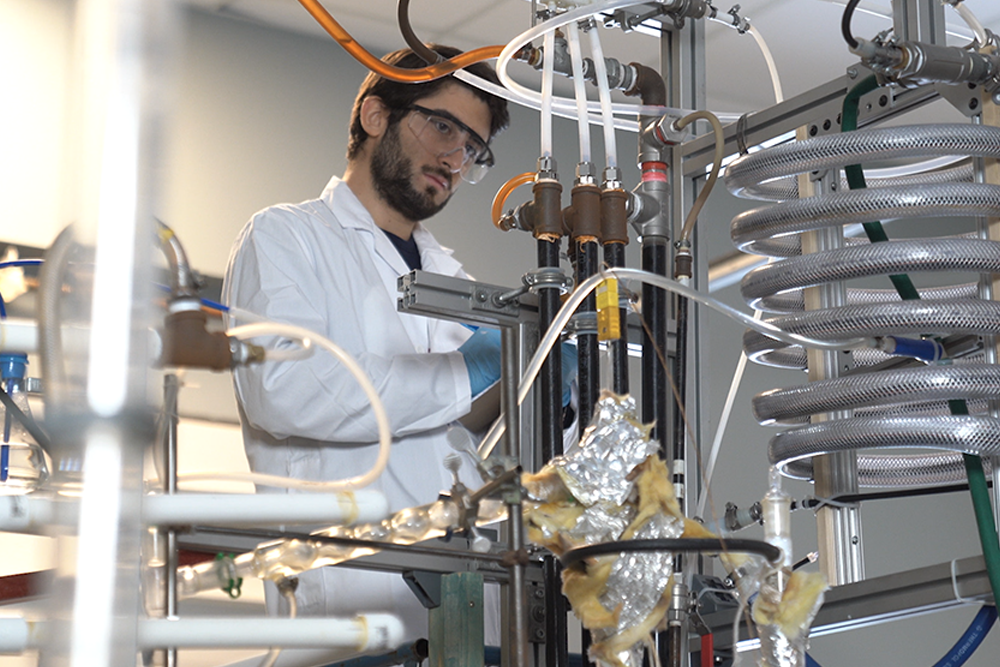Ontario Tech hosts major international workshop on integrated nuclear and renewable energy systems
Virtual event connected more than 700 registrants representing 75 countries
April 13, 2022

Integrated energy systems involving nuclear and renewables sources are seen as one of the solutions to face increasing worldwide demand for energy and meet contemporary global energy challenges. Advances in sustainable energy have the potential to help Canada and the world respond to climate change, produce reliable, carbon-free electricity, create jobs, and move faster toward net zero emissions by 2050.
As a prominent centre of sustainable energy research and because of its strong reputation for expertise and new knowledge creation, Ontario Tech University is designated an International Atomic Energy Agency (IAEA) Collaborating Centre, the only one in Canada.
On March 24 and 25, Ontario Tech held an online Workshop on Integrated Nuclear-Renewable Energy Systems, bringing together energy experts from academia, industry and international organizations. The technical discussions examined the future of the energy sector in light of growing interest in integrated nuclear-renewable energy systems and their role in the hydrogen economy.
The linkages between renewables and nuclear in integrated sustainable energy systems open the door to a wide variety of clean energy applications beyond electricity production, including large-scale clean hydrogen production. Hydrogen and fuel cells will play an important role in various sectors such as transportation, commercial and industrial. There have also been major recent developments in nuclear energy thanks to the promise of small modular reactors (SMRs) that can serve off-grid communities and remote areas. Producing smaller bundles of power than traditional large nuclear plants, SMRs are expected to reduce future costs in energy transmission and distribution infrastructure.
Quotes
“Driving new research and discovery in clean and renewable energy technology is one of Ontario Tech’s strengths. Our March workshops brought together researchers and energy sector partners from around the world, and reinforced the vital role that Ontario Tech as an IAEA Collaborating Centre can play as a champion of small modular reactors and integrated energy systems.”
-Dr. Les Jacobs, Vice-President, Research and Innovation, Ontario Tech University
“As we transition to a carbon emissions-free future, the global energy community is at a key historical inflection point. As an IAEA Collaborating Centre, Ontario Tech University is proud to provide an interactive platform for international participants to collaborate and exchange new ideas.”
-Dr. Hossam Kishawy, Dean of the Faculty of Engineering and Applied Science; and of the Faculty of Energy systems and Nuclear Science, Ontario Tech University
“The IAEA acknowledges Canada’s important international role in R&D and deployment of advanced nuclear power reactors, including the coming newbuilds in Ontario using small modular reactors and microreactors in integrated energy systems. These topics are timely as we face the challenge of meeting energy demand to power global development. Through Ontario Tech University as an IAEA Collaborating Centre, we will continue to explore how nuclear energy can be used in a more sustainable and versatile way, beyond solely electricity production. Innovation is key to that success.”
-Aline des Cloizeaux, Director, Division of Nuclear Power, Department of Nuclear Energy, International Atomic Energy Agency
Related links and backgrounders for further learning
- Ontario Tech University is a community member in the Centre for Canadian Nuclear Sustainability (70-second video).
- Hydrogen energy research at Ontario Tech University (Ontario Tech news story, March 2021).
- Small Modular Reactor research at Ontario Tech University (Ontario Tech news story, April 2021).
- Research at Ontario Tech University.
- Faculty of Engineering and Applied Science.
- Faculty of Energy Systems and Nuclear Science.
- Clean Energy Research Laboratory.
- Energy Systems and Nuclear Science Research Centre.



